Navigating Resume Trends in 2025: What You Need to Know
Create Your Resume NowYou already know what the guidelines for resume writing are. But do all job seekers follow them to a tee? Well, check for yourself—this article compiles statistics detailing what Zety users have written in over 9 million resumes crafted using Zety resume builder from January 1 through November 30, 2024. We’ve also analyzed their stylistic choices, collected useful statistics for new graduates, found new trends in resume writing, and prepared our expert recommendations for 2025!
Top insights:
- The year 2025 embraces flexibility, having proven that one-page resumes are passé.
- Soft skills are your unique superpower in a world increasingly shaped by generative AI.
- Tech-savvy professionals can easily create a resume during a 15-minute coffee break.
- Minimalism is still the ultimate sophistication when it comes to preferred resume designs.
What’s a Typical Resume Like in 2024?
Based on the data from our resume builder, the average resume in 2024 is:
- Created in 18.76 minutes
- 2.59 pages long
- Lists around 75.4 months of work experience
- Presents 9.65 skills
- Features a two-column template and a sans-serif font.
- Includes only the essential resume sections: header, work experience, education, and skills
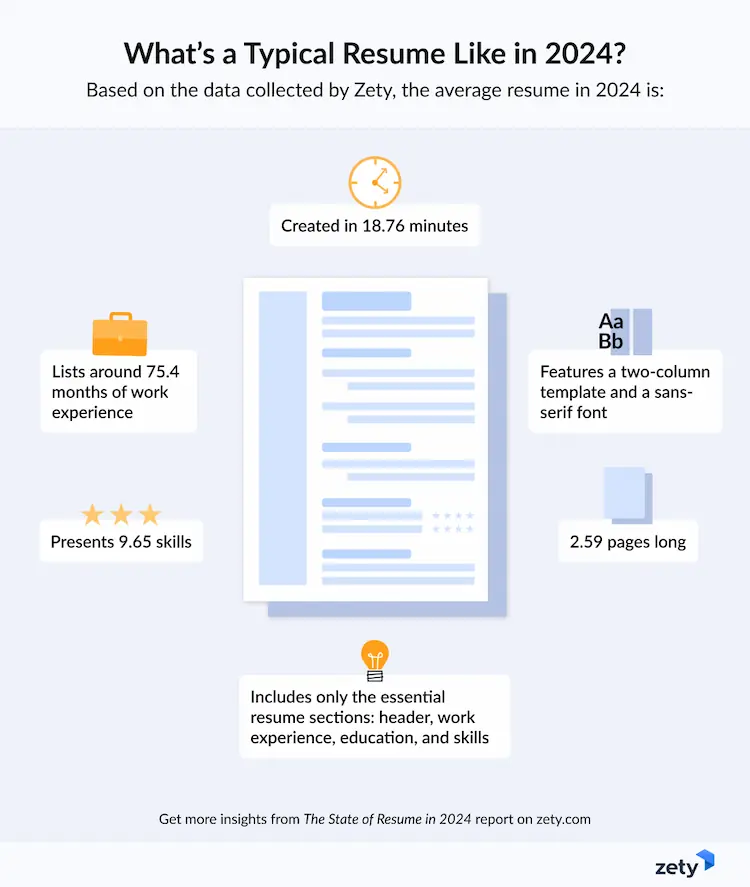
How do these numbers compare to professional resume-writing principles? The average resume significantly exceeds the suggested length, despite using only the mandatory sections. My guess is that job seekers struggle with selecting the most relevant information and tailoring it to the specific job posting—instead, they most likely create a more general resume they can use to apply for multiple jobs. While this might seem like a time-saving strategy, it may not be an effective one: resumes tailored to the job ad have a much higher success rate.
In-Depth Look at the Contents of a Resume
Let’s dive deeper into numbers and discover the habits and preferences of various groups of job applicants.
1. Resume Writing Time
Writing a resume from scratch takes a lot of work. However, using an online resume builder like Zety can significantly speed up this process. The numbers prove it: the average time a person spends writing a resume is 18.76 minutes. IT and mathematical professionals are the quickest, needing only 11.2 minutes on average. Craftspeople take the longest time: 26.8 minutes on average—still, much faster than using a word processor app.
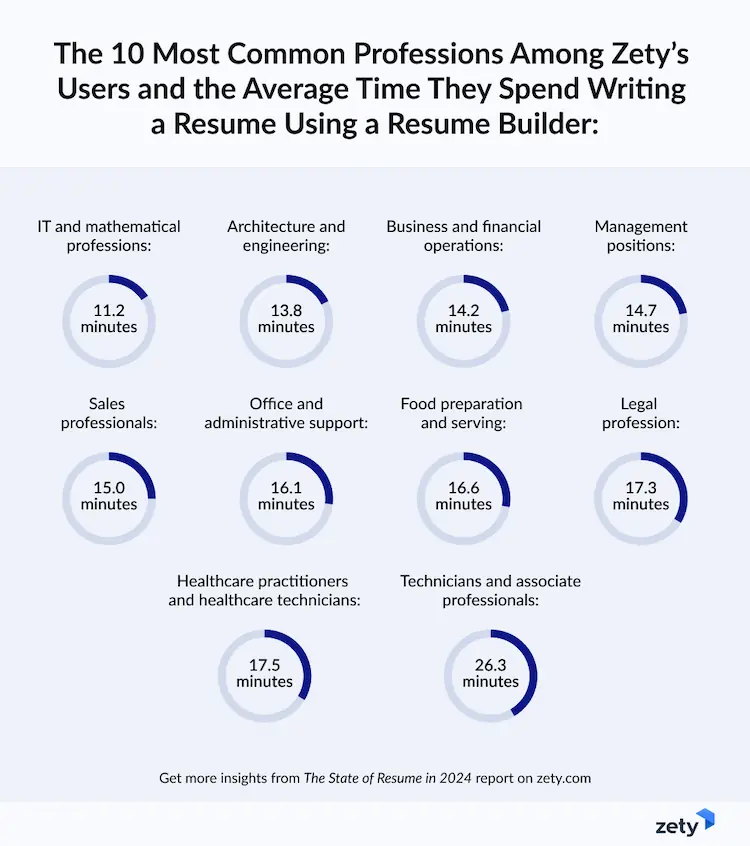
We can assume that job seekers with highly-developed computer skills create their resumes quickly, and those who have a lower level of computer literacy may need more time to use an online resume builder effectively. Some types of resumes, such as medical ones, may also need extra work, as they usually involve more information.
2. Length of a Resume
Resume-writing professionals repeat it like a mantra: the best resumes are 1 to 2 pages long. However, it seems that job seekers' opinion differs: the average resume created by Zety users is 2.59 pages long.
Here’s a breakdown of resume length by industry:
- IT industry: 2.73 pages
- Engineering: 2.67 pages
- Creative professions: 2.34 pages
- Administrative jobs: 2.18 pages
- Healthcare: 2.37 pages
- Finance: 2.51 pages
- Retail: 2.28 pages
- Leisure & hospitality: 2.25 pages
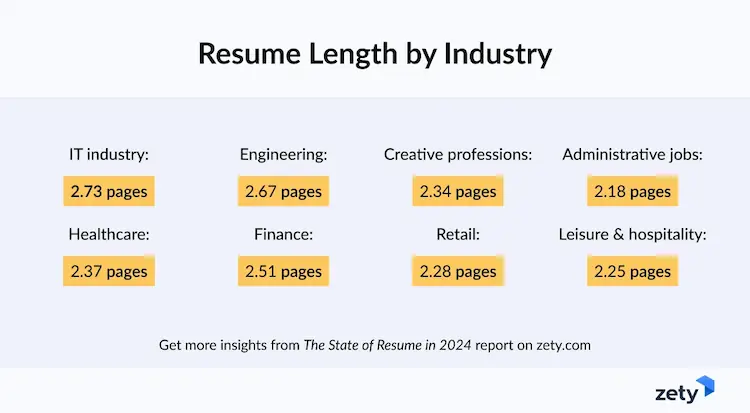
However, that doesn’t mean everyone could easily squeeze their resumes into a neat 2 pages, as several professions often created applications that were much longer than that.
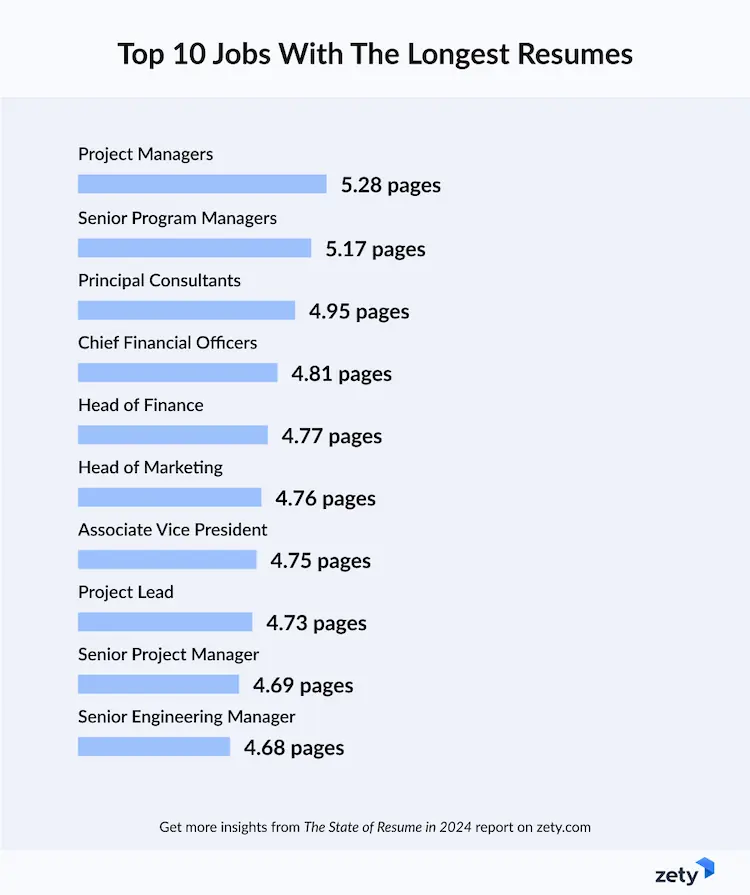
The shortest resumes (less than 2 pages long) most often belonged to individuals in entry-level positions, including interns (1.1 pages), junior assistants (1.2 pages), telecallers (1.2 pages), data entry clerks (1.3 pages), and retail associates (1.3 pages).
The average resume length by seniority level is:
- Entry-level jobs: 1.46 pages
- Mid-level jobs: 3.3 pages
- Senior-level jobs: 4.13 pages
Most users (~55.89%) create resumes less than 700 characters long, with around one-third of job seekers preferring resumes between 300 and 600 characters. However, over half (~54%) of Zety users write resumes that exceed 600 characters. When it comes to longer resumes, they were often picked by advertising & marketing specialists (over 6,500 users), executives (8,900+ users), IT professionals (over 13,800 users), and operations management professionals (6,800+ users).
3. Personal Information on a Resume
We were quite surprised to discover that job seekers add unnecessary personal information to their resumes. City was declared by 2,650,705 individuals (out of 9,023,204 who created their resumes in the chosen date range), so by nearly 30% of our users.
What’s even more surprising is that 11.95% of resume builder users added a photo to their resume. However, these job seekers may wish to apply for jobs outside the U.S. It’s worth noting that including a photo in a job application is not advised in the States, as it can lead to discriminatory hiring practices.
4. Resume Profile
One of the key tips that we offer job seekers is to start a resume with a professional profile—and that’s why our online resume creator features an option to generate the introduction using information from the resume.
However, not everyone utilized this option: 1,572,459 individuals added the resume profile section, which constitutes just 38.11% of users. The average word count of the resume profile is 55 words, which is a reasonable length for introducing yourself and showing your key qualifications.

5. Work Experience
Data concerning our users’ job experience shows that both senior professionals and job seekers with no experience benefit from using an online resume builder. On average, Zety users mentioned around 75.4 months of work experience, which equals around 6 years. However, 28.86% of users had less than 3 years of experience, and 3.59% had no experience whatsoever.

Here’s the average number of jobs declared by our top 20 most common professions:
- Teacher: 1.68 jobs
- Customer Service Representatives: 2.54 jobs
- Software Engineer: 2.09 jobs
- Accountant: 2.10 jobs
- Assistant Manager: 3.08 jobs
- Cashier: 2.09 jobs
- Manager: 2.89 jobs
- Sales Executive: 2.31 jobs
- Project Manager: 4.30 jobs
- Sales Manager: 2.96 jobs
- Senior Software Engineer: 3.44 jobs
- Software Developer: 2.11 jobs
- Sales Associate: 2.22 jobs
- Data Analyst: 2.17 jobs
- Team Leader: 2.97 jobs
- Supervisor: 2.40 jobs
- Driver: 2.05 jobs
- Receptionist: 2.27 jobs
- Tutor: 2.06 jobs
- Administrative Assistant: 2.66 jobs
The vast majority of job seekers work in a traditional workplace—only 6.04% of users listed a remote work position. This shows that, despite technological advancements allowing for working from home, most companies haven’t embraced remote work yet.
6. Education on a Resume

Education is an important section of a resume, however, not all of Zety users provided detailed information about their schooling. Out of almost 1.3 million that did, over 150,000 listed a high school diploma as their highest level of education. There’s also an impressive number of users with PhDs—over 12,000!
The most common degrees were:
- Bachelor of Science: 279,598 users
- Bachelor of Arts: 141,721 users
- MBA: 101,237 users
Among those with university degrees, common majors included:
- Commerce
- Engineering
- Business administration
- Computer science
- Accountancy
- Management
- Economics
- Nursing
The collected data shows that most job seekers hold rather conventional degrees and majors.
7. Skills
An effective resume includes skills that match both the applicant’s profession and the job ad. However, we’ve noticed that the number of skills included by users depends on their experience level.
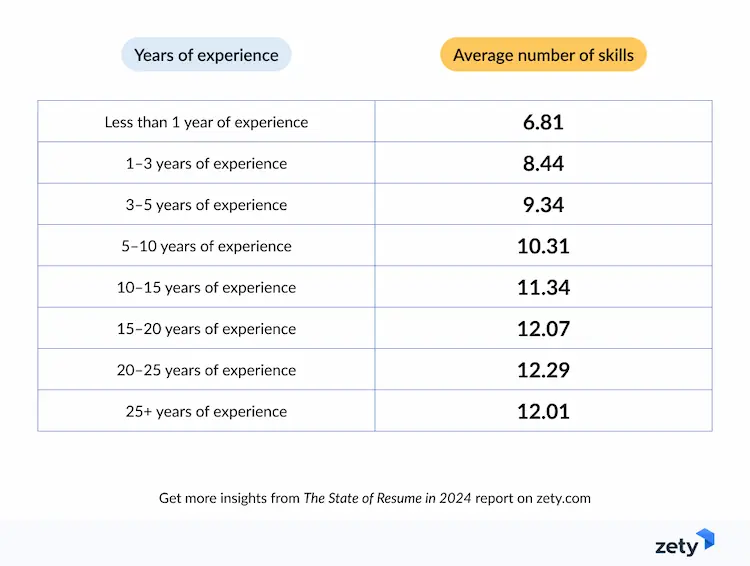
So, which are the 10 most common skills added to a resume in 2024?
- Teamwork & collaboration: listed by 410K users
- Problem-solving: added by 360K users
- Multitasking: selected by 302K users
- Excellent communication: listed by 230K users
- Decision making: added by 208K users
- Time management: selected by 206K users
- Customer service: added by 203K users
- Active listening: mentioned by 168K users
- Computer skills: listed by 152K users
- Data entry: added by 129K users
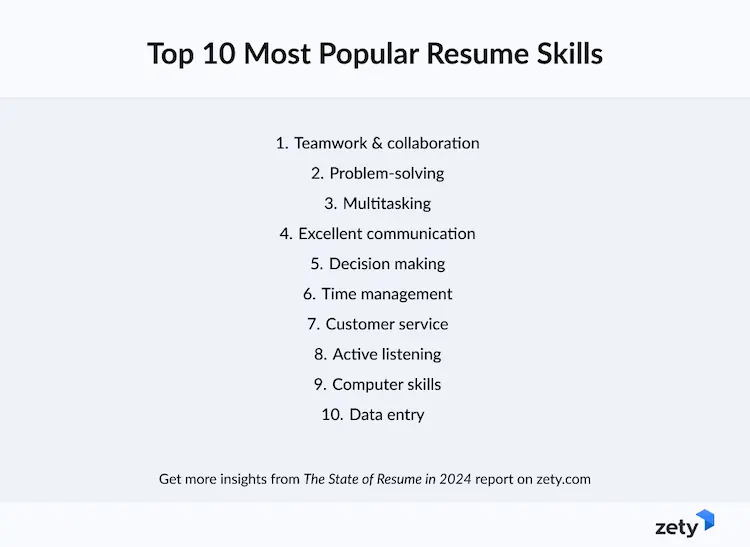 It’s easy to notice that the skills most often selected by job seekers are transferable competencies, meaning that they apply to numerous professions.
It’s easy to notice that the skills most often selected by job seekers are transferable competencies, meaning that they apply to numerous professions.
8. Additional Sections
Our career experts always advise utilizing additional resume sections. We’re happy to report that over 3.86 million job seekers followed this advice!
The top 10 most common additional resume sections include:
- Languages
- Certifications
- Interests
- Software
- Accomplishments
- Personal details
- Websites, portfolios, profiles
- Additional information
- Affiliations
- Hobbies
Job seekers also added other useful sections, such as driving license information, which was selected by 4,500+ users. What about more unique choices? These include: cricket (used 2,642 times!), fishing (added by 162 users), and sleeping (listed by 26 users).
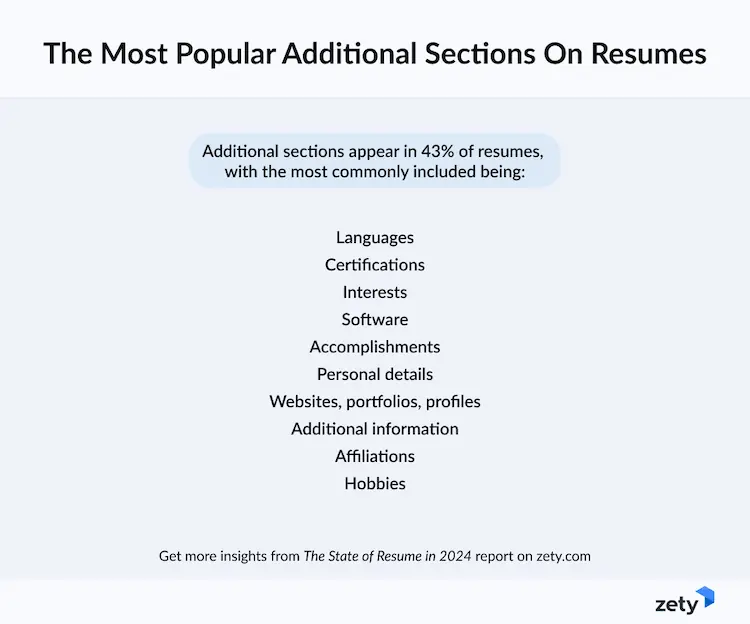
9. Certifications
22% of resumes feature a certification section. They were most commonly added by professionals in the following categories:
- Business operations
- Computer occupations
- Management
- Healthcare
- Teachers and instructors
- Engineering
- Operations specialists
- Top executives
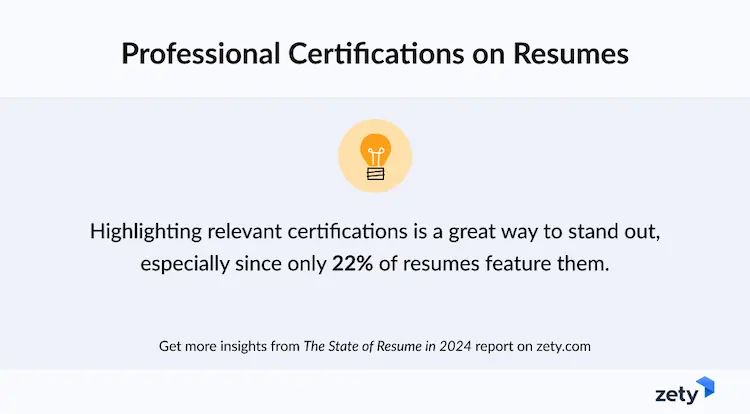
The most common certifications were professional licenses (most likely required by law) as well as:
- Certified Manager Certification
- Project Management Professional
- Certified Sales Professional
- Certified Public Accountant
- Certified Administrative Professional
- Certified Business Analysis Professional
- Certified Professional Sales Person
- TESOL Certified
- Java SE Certification
- Certified Personal Trainer
10. Foreign Languages
Languages were added to resumes by 795,977 users.
The top 5 foreign languages listed in the U.S. are:
- Spanish
- French
- Hindi
- Arabic
- Mandarin Chinese
The results aren’t surprising, as more than 43.4 million people living in the U.S. speak Spanish.
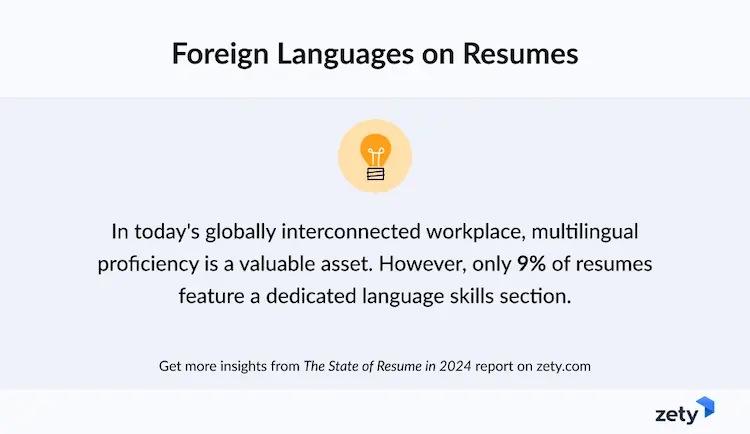
Closeup on Resume Design
It’s clear to see that job seekers prefer professional, modern resume designs—and these are easy to find in our online resume creator. The top 3 templates selected by Zety users in 2024 were Cascade (used by 1.83 million job seekers), Concept (over 599K users), and Diamond (over 417K users). Cascade and Concept templates feature a sidebar which is great for listing contact information and skills. Diamond is a classic one-column design, a great choice for more traditionally-minded applicants.
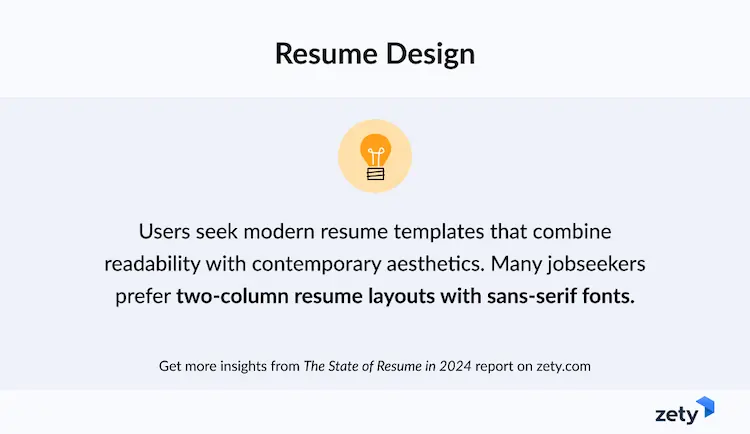
Our professional resume writers highlight the importance of using easy-to-read fonts in job applications. The vast majority of job seekers who used our online resume builder used Century Gothic, which is a classic, sans-serif font that looks both great on screen and when printed. When users decide to change the default font on templates, they usually choose Times New Roman, Arial, Georgia, Verdana, or Blinker fonts.
Resume Statistics for Recent Graduates
Entering the job market as a recent graduate can be challenging, but understanding what employers value on resumes is the first step toward gaining their attention. Insights from the National Association of Colleges and Employers (NACE) provide key trends and valuable tips for 2025 graduates.
1. Employers Prioritize Problem-Solving and Teamwork
According to NACE’s 2025 Job Outlook report, problem-solving skills and teamwork abilities remain highly sought after by employers. These skills, combined with attributes like strong work ethic and effective communication, are crucial for success in the modern workplace.
Graduates should demonstrate these skills with concrete examples in their resumes, drawing from academic projects, internships, and extracurricular activities.
2. Hybrid Work Skills Are Key for Entry-Level Positions
The workplace is increasingly adopting hybrid models. For entry-level positions, 54% of employers now offer hybrid work arrangements, while 42% of roles remain fully in-person. Fully remote entry-level opportunities are limited, at only 4%, emphasizing the need for adaptability in hybrid work environments.
Graduates proficient in digital tools like Microsoft Teams, Slack, and Zoom can highlight these skills to meet employer expectations.
3. Skills-Based Hiring Is on the Rise
Employers are moving beyond traditional screening methods, with 64.8% of organizations implementing skills-based hiring practices. This includes competency-based job descriptions and structured interview rubrics.
Graduates can benefit by tailoring their resumes to highlight key competencies, such as critical thinking, leadership, and technical expertise.
4. GPA Screening Practices Are Shifting
While GPA remains a consideration for some employers, its use is evolving. NACE reports that 46.4% of employers use GPA as a screening tool, reflecting a moderate uptick in recent years. However, a growing emphasis on holistic hiring practices means graduates can compensate for lower GPAs by emphasizing internships, research, or leadership roles.
5. Internships and Student Activities Are Valued
Employers place significant weight on internship experience and extracurricular activities when evaluating recent graduates.
- Internship experience, whether paid or unpaid, is a critical factor in demonstrating industry readiness.
- Involvement in student organizations, particularly those related to a candidate’s major or career goals, showcases leadership and initiative.
Graduates are encouraged to include specific examples of their contributions and accomplishments in these roles to make their resumes more compelling.
6. Salary Trends for the Class of 2025
The report highlights optimism in salary projections for 2025 graduates:
- A majority of employers plan to increase salaries for both bachelor’s and master’s degree holders.
- Over 55% of organizations intend to offer sign-on bonuses to attract top talent.
This reflects a competitive hiring landscape where organizations are investing in attracting and retaining skilled graduates.
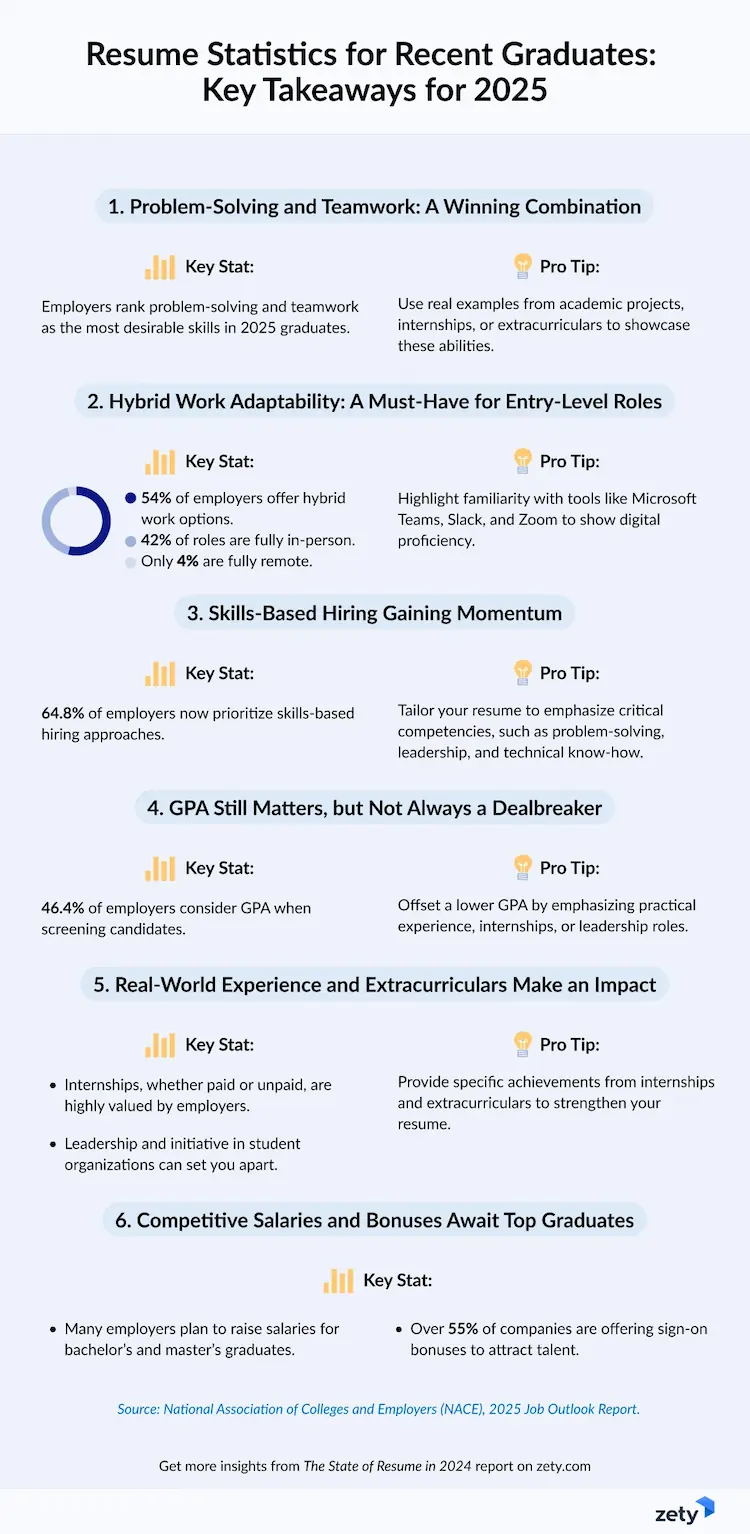
Your Resume’s Crystal Ball: What 2025 Has in Store
Job application documents have evolved over the years, so let’s look at the factors that shaped the state of a resume in 2024:
1. AI-Powered Tools
With AI adoption being crucial for business success in 2025, it’s no wonder that not only employers but also job seekers have a lot to gain from new technologies. In fact, a study conducted by MIT Sloan PhD student Emma van Inwegen and co-researchers proved just that. Job seekers who used algorithmic writing tools to improve their resumes received 7.8% more job offers than those who relied only on themselves.
Modern tools are irreplaceable in terms of catching errors and typos, which otherwise would easily be overlooked. And an error-free job application is not just a matter of proving that you’re detail-oriented. It has a tangible impact on your chances of getting hired.
In fact, the same study found that candidates whose resumes contained less than 90% correctly spelt words had just a 3% likelihood of being hired within their first month.
2. Soft Skills Turn Into Power Skills
As AI is changing the way we work, more importance is being placed on soft skills. In fact, they’ve even been rebranded and are now called power skills. What makes them so important? The fact is that they’re very difficult to learn and thus impossible to master by artificial intelligence. They’re also transferable between jobs and industries, which makes them essential for the average worker.
How important are they? The World Economic Forum predicts that 44% of workers’ core skills will change by 2027. Having soft skills such as creative thinking, resilience, empathy, and leadership skills can help workers stay relevant in the changing world. Thus, highlighting power skills in a resume will become even more important.
3. Skills-Based Hiring
The tight labor market and talent shortages force companies to move away from traditional, credential-based hiring to a new, skills-based hiring practice. What does it mean, exactly? Dropping the requirement for specific degrees and educational background for jobs that don’t necessarily require them. For example: it’s perfectly possible to hire a manager who doesn’t have a degree in management and has developed managerial skills throughout their career.
So far, businesses have benefitted from embracing skills-based hiring strategies, as they allowed for expanding hiring pools and attracting more talent. Plus, there’s another advantage: moving away from traditional hiring leads to a more diverse workforce that aligns with DEI policies. Of course, skills-based hiring won’t replace traditional hiring completely—there are plenty of professions that require degrees for a reason, such as engineering or law.
For an average job seeker, the move toward skill-based hiring means that many hiring managers expect to see the right set of skills on a resume straight away.
4. Hiring on the Rise in 2025
According to Robert Half’s State of U.S. Hiring Survey, 63% of companies plan to create new positions in the first half of 2025. It’s a significant increase compared to the 52% of respondents planning to expand their workforce in the second half of 2024.
Such a prediction is always good news, but with Gallup reporting that the number of U.S. employees watching or actively seeking a new job is on the rise, this prognosis is even more warmly welcomed by job seekers. What’s more, fewer employees have been extremely satisfied with their jobs in 2023 and 2024 than in the previous years.
The increase in hiring will look different depending on a particular industry, but overall, 2025 is looking pretty optimistic. For example, despite a drop in job opportunities for software developers in the last few years, this trend is about to take an opposite direction in 2025, according to the 2024 Tech Hiring Trends report by Karat.
The U.S. job market sees different trends each year, but one thing remains constant—a strong, tailored job application is the ultimate passkey to unlocking the best job opportunities.
Recommendations for 2025
Working smarter, not harder, is always the best way to combat the tasks at hand. With our recommendations, you’ll be able to apply this universal principle also to your career advancement activities:
1. Don’t Believe in the One-Page Resume Myth
Some say that less is more, but that’s not always the case. Especially when it comes to your resume, which should present all of your relevant skills and experience. Trying to squeeze everything into a one-page resume template can sabotage your job-hunting efforts, especially if you’re an experienced professional. That’s why the length of your resume should be determined by how well it’s able to present your full potential and answer the employers’ expectations.
2. Tailor-Made Resumes: Haute Couture for Your Career
Your resume should fit your potential employer’s needs as perfectly as a haute couture ensemble. Using one generic resume to apply for multiple roles is like wearing the same outfit on every occasion—it rarely leaves the right impression. While the thought of tailoring your resume to every job offer may seem daunting, it’s actually pretty easy, especially if you use professional resume-building tools to boost your job-hunting efficiency.
"A resume in 2025 is not just a list of qualifications—it’s a reflection of your emotional intelligence and ability to understand and address others' needs. By tailoring your resume to highlight how your expertise aligns with the employer’s goals, you demonstrate traits that are often called 'power skills': empathy, communication, and adaptability. These traits, more than technical abilities alone, show you are not just qualified but also capable of building meaningful connections and contributing to the success of the team and organization."
3. AI + You: The Ultimate Power Couple for Job Hunting
Yes—technology can help you find a job in a multitude of ways. Online resume builders can handle the time-consuming task of writing a resume and a matching cover letter. Plus, they’ll do it perfectly, so no need to worry about typos or spelling mistakes. Additionally, many professions will transition to using AI tools daily, so gaining some experience with these can help you prepare for a new role.
4. Upskill or Stand Still: The Choice is Yours
You might be a senior executive, but if your knowledge comes from the early 1990s, your job-seeking efforts may fail. The world of work evolves constantly, and so do the skills required to succeed at any given job. Embrace lifelong learning to stay on top of things, and make sure that the skills you highlight in a resume reflect your attitude.
5. Extra Sections, Extra Impact
The core resume sections must indeed be polished to perfection. But that’s just the bare minimum of an effective resume. Skipping additional sections is a mistake that can cost a job. Extra information can make your resume stand out—it can also help hiring managers see you as a real person.
Summary
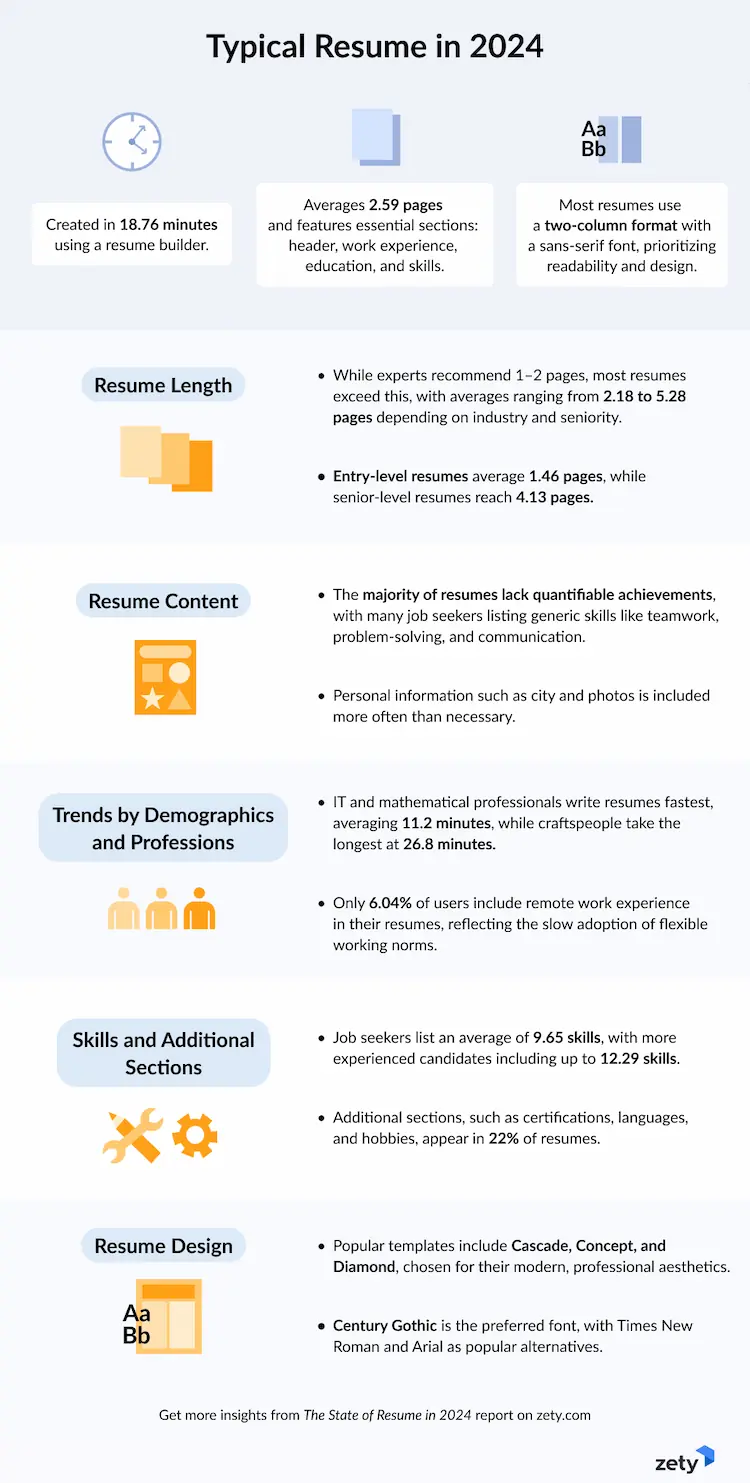
This in-depth report examines over 9 million resumes crafted using Zety’s online resume builder from January 1 through November 30, 2024, revealing key trends, stylistic choices, and resume-writing habits in 2024. It offers insights into how job seekers approach resume creation, contrasts these practices with professional guidelines, and provides expert recommendations for 2025.
About Zety’s Editorial Process
This article has been reviewed by our editorial team to make sure it follows Zety's editorial guidelines. We’re committed to sharing our expertise and giving you trustworthy career advice tailored to your needs. High-quality content is what brings over 40 million readers to our site every year. But we don't stop there. Our team conducts original research to understand the job market better, and we pride ourselves on being quoted by top universities and prime media outlets from around the world.
Sources
- PwC, “2025 AI Business Predictions”
- MIT Sloan, “Job seekers with AI-boosted resumes more likely to be hired”
- PR Newswire, "Hiring Plans on the Rise: More than 6 in 10 U.S. Companies Plan to Add New Positions in the First Half of 2025"
- NACE, "What Are Employers Looking for When Reviewing College Students’ Resumes?"
- NACE, "Job Outlook 2025"
- Gallup, "The Great Detachment: Why Employees Feel Stuck"
- Karat, "2024 Tech Hiring Trends"
- Axios, "The rise and fall of software developer jobs"
- United States Census Bureau, Language Spoken at Home
- World Economic Forum, The Future of Jobs Report 2023
- McKinsey Global Institute, "Help wanted: Charting the challenge of tight labor markets in advanced economies"
